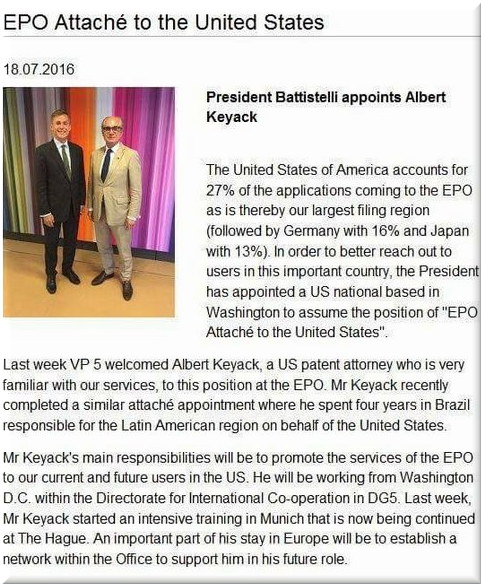

MYSELF and others at Techrights worry deeply. We worry that Battistelli (of UMP, the French conservative party) will turn the Office into another large corporations-leaning USPTO and London (or some other European cities) into the next Eastern District of Texas, complete with venue shifting (dragging defendants to a distant and plaintiff-friendly court), high/unbearable litigation costs that favour settlement in spite of injustice (unless the defendant has deep pockets), massive scope of injunctions (beyond an entire continent), and of course software patents (among other low-quality patents). One reader told us yesterday, "have you heard of the latest load of rubbish from the EPO?" See the above screenshot. No comment is even necessary. How much Europe is there in the 'European' Patent Office when foreign companies are enjoying a fast lane?
"How much Europe is there in the 'European' Patent Office when foreign companies are enjoying a fast lane?"EPO workers are rightly afraid. Their job security (and their entire employer) has been compromised and is now at mortal risk (stakeholders know what's happening) because of Battistelli and his friends. Battistelli does not even seem to mind. He attacks sceptics, not just critics. He is like Munich's Erdoßan. Stability is not the goal; implementing his self-serving vision is the goal. Megalomaniacs can never admit their mistakes and change course.
News sites have learned to distrust Battistelli. Yesterday, for example, Managing IP asked readers about the latest lies from Battistelli's PR department rather than publish an article about it, perhaps seeing it for what it really is (propaganda). Yesterday the EPO PR people were trying to spread the message, but we have not yet seen a single Web site (even IP sites) covering it. Journalists seem to have learned their lesson; Battistelli has zero credibility and zero approval rating among his staff.
"Journalists seem to have learned their lesson; Battistelli has zero credibility and zero approval rating among his staff."Looking at IP Kat yesterday, we saw nothing but affirmation that people now know better that there is a profound problem at the EPO. "In this context," one person wrote, "I am also reminded of persistent rumors that the EPO quality is down." Here is the comment in full:
I reread the discussion again and it seems indeed that the days of the board of appeal are counted. Unfortunately, that also means that the examiners quality will not be controlled any more. When I talk to examiners, their main concern is that the BOA would turn over one of their decisions. THAT is what prevents them from cutting corners. In this context, I am also reminded of persistent rumors that the EPO quality is down. And I also know that the Office is hiring less competent examiners, quite simply because the pay is not as attractive as it was. Munich is expensive, local firms are not finding the engineers they need and have raised their entry salaries accordingly while the EPO has lowered theirs.
I also read here that some patent attorneys are suggesting that the applicants use the national route, for increased legal certainty. How will that solve their problems when the competitor comes with an infrigement case based on an unclear, vague patent granted by the EPO and validated by the UPC, which will have force of law in all EU states?
If you want to know the future of the EPO, take a peek at the official "social report": http://documents.epo.org/projects/babylon/eponet.nsf/0/CA803AEC70D6E89FC1257FF40042DAA4/$File/social_report_2015_en.pdf
Despite being nothing more than a dry and dusty collection of statistics, the report contains some interesting figures.
Some of these clearly demonstrate that, at least in 2015, the EPO faced significant problems in recruiting. For example, relative to the figures for 2014:
Numbers of advertised vacancies: up >25% Number of job applications received: down 12% Nationalities decreased presence: GB (-32), DE (-29), NL (-28), AT (-10), SE (-7), DK (-6), CH (-5), IE (-3), PT (-1), LU (-1) Nationalities increased presence: RO (+9), ES (+8), IT (+6), PL (+6), TR (+4), BG (+3), RS (+3), LT (+2), FI (+1), FR (+1), HR (+1), MK (+1) Permanent staff: down 1.3% Contract staff: up 13.45% New hires: down 30% Termination of employment: up 44% Increases in termination: retirement (+51%), resignation (+44%), invalidity (+36%)
The figures also show signs of increasingly aggressive management tactics, such as no strikes allowed in 2015 (vs. 22 days in 2014), 99% of all internal appeals rejected (vs. 88% in 2014). The trend at ILOAT, however, is going in the opposite direction (with allowed or partially allowed cases virtually doubling in percentage).
Given the shocking trends that it reveals (which appear to point to an organisation that is in crisis), I am somewhat surprised that this report was produced at all.
What do the AC have to say about this? Figures that speak for themselves surely cannot be brushed under the carpet so easily.
It is true that the office is experiencing difficulties at recruiting. But that did not stop Minnoye to start a project to eliminate all examination stock backlog until end 2020. The project involves recruiting enough examiners to deal with the backlog (=hundreds) thereby creating "overcapacity". The project started this month, the first applicant were sent letters requiring them to state wether they were still interested in examination.
Minnoye will push this at all cost: stock must be zero within 4 years.
Sure, but the increase in money will only be a short-term effect. Unlike BB, the AC is a permanent fixture, and so will eventually have to deal with the mess that is currently being created. From this perspective, I still find it somewhat puzzling that the AC is doing so little to stop BB dynamiting the foundations upon which the EPO (and its reputation) is built.